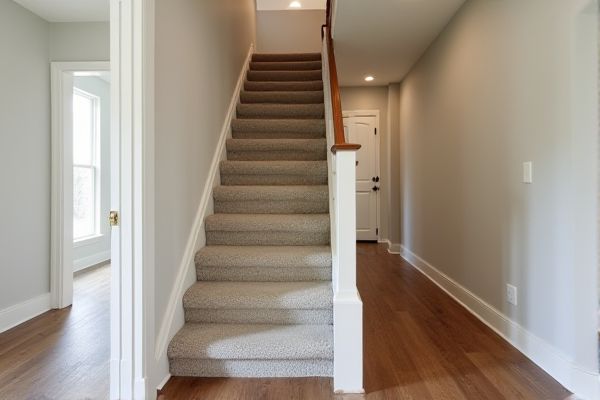
Carpeted stairs offer enhanced comfort and noise reduction, making them ideal for homes with children or pets, while hardwood stairs provide a timeless, elegant look that is easier to clean and increases property value. Discover the key differences and benefits to determine which option suits your style and lifestyle best by reading the rest of this article.
Table of Comparison
| Feature | Carpeted Stairs | Hardwood Stairs |
|---|---|---|
| Appearance | Soft, warm, available in various colors and textures | Elegant, classic, natural wood grain visible |
| Durability | Susceptible to wear, staining, and fraying over time | Highly durable, resistant to scratches and dents |
| Maintenance | Requires regular vacuuming and occasional deep cleaning | Easy to clean with sweeping and occasional polishing |
| Safety | Provides traction, reduces risk of slipping | Can be slippery, may require anti-slip treatments |
| Noise | Absorbs sound, quieter footsteps | Can be noisy, amplifies footsteps |
| Cost | Generally more affordable installation | Usually higher cost due to materials and installation |
| Installation | Faster and easier to install | Requires skilled labor, longer installation time |
Introduction to Carpeted vs Hardwood Stairs
Carpeted stairs provide enhanced comfort and slip resistance, making them a popular choice for homes with children or elderly individuals, while hardwood stairs offer durability and timeless aesthetic appeal that can increase property value. Your decision between carpeted and hardwood stairs will depend on factors such as maintenance preferences, noise levels, and design style. Both options can be customized to suit your home's specific needs and style, balancing functionality with visual impact.
Aesthetic Appeal: Carpeted vs Hardwood Stairs
Carpeted stairs provide a warm, cozy aesthetic with a variety of textures and colors that can complement your interior design, creating a soft, inviting atmosphere. Hardwood stairs offer a timeless, elegant look with rich natural grains and finishes that enhance the architectural beauty of your home while adding value and durability. Choosing between carpeted and hardwood stairs depends on whether you prioritize comfort and softness or classic sophistication and long-lasting appeal.
Safety Considerations: Slip Resistance and Falls
Carpeted stairs provide enhanced slip resistance by offering a textured surface that reduces the risk of falls compared to the smooth, potentially slippery surface of hardwood stairs. The cushioning effect of carpet also mitigates injury severity in case of a fall, making it a safer option for homes with children or elderly individuals. Hardwood stairs require additional safety measures such as non-slip treads or runners to improve traction and minimize fall hazards.
Comfort and Noise Reduction Differences
Carpeted stairs provide superior comfort by offering a softer surface that cushions each step, reducing foot fatigue. The carpet fibers significantly absorb sound, minimizing noise from footsteps and creating a quieter home environment. Hardwood stairs, while durable and easy to clean, tend to amplify sound and lack the cushioning effect, making carpet a preferred choice if comfort and noise reduction are priorities for Your living space.
Maintenance and Cleaning Requirements
Carpeted stairs require regular vacuuming and occasional deep cleaning to remove dirt, dust, and allergens trapped in the fibers, making maintenance more frequent but less intensive. Hardwood stairs demand periodic sweeping, mopping with specialized wood cleaners, and refinishing over time to preserve their appearance and prevent scratches. Your choice between carpeted and hardwood stairs will impact the time and effort needed for upkeep, with carpet offering more frequent surface cleaning and hardwood necessitating more occasional but detailed care.
Durability and Longevity Comparison
Carpeted stairs provide a cushioned surface that reduces wear and tear, but they tend to show signs of aging such as matting and staining within 5 to 10 years, depending on foot traffic. Hardwood stairs, particularly those made from oak, maple, or hickory, offer superior durability and can last several decades when properly maintained and periodically refinished. The natural resilience of hardwood resists denting and scratching far better than carpet, making it a more long-lasting option for high-traffic staircase areas.
Cost Analysis: Installation and Long-Term Expenses
Carpeted stairs generally offer a lower initial installation cost compared to hardwood stairs, making them a budget-friendly option for many homeowners. However, carpet may require more frequent replacement and cleaning, leading to higher long-term maintenance expenses. Hardwood stairs involve a higher upfront investment but provide greater durability and easier upkeep, potentially reducing overall lifetime costs and increasing home value.
Impact on Home Value and Buyer Appeal
Carpeted stairs provide a cozy and safe surface, appealing to families with children or elderly members, but may slightly lower home value compared to hardwood stairs due to perceptions of upkeep and durability. Hardwood stairs are often favored by buyers for their timeless elegance and easy maintenance, typically boosting home value and buyer appeal. Real estate agents note homes with hardwood stairs tend to attract higher offers and faster sales in competitive markets.
Best Use Cases for Carpeted and Hardwood Stairs
Carpeted stairs are ideal for homes seeking enhanced safety, noise reduction, and added warmth, making them perfect for households with children or elderly individuals. Hardwood stairs suit spaces prioritizing durability, easy maintenance, and a classic, elegant appearance, often favored in high-traffic areas or modern interior designs. Your choice depends on weighing comfort and safety against style and practicality.
Choosing the Right Option for Your Home
Carpeted stairs offer enhanced safety and comfort, making them ideal for homes with children or elderly residents, while hardwood stairs provide durability and a timeless aesthetic that can increase property value. Consider factors such as maintenance, noise reduction, and interior design when selecting the best option for your home. Your choice should balance practicality with style to ensure both functionality and visual appeal.
 homyna.com
homyna.com